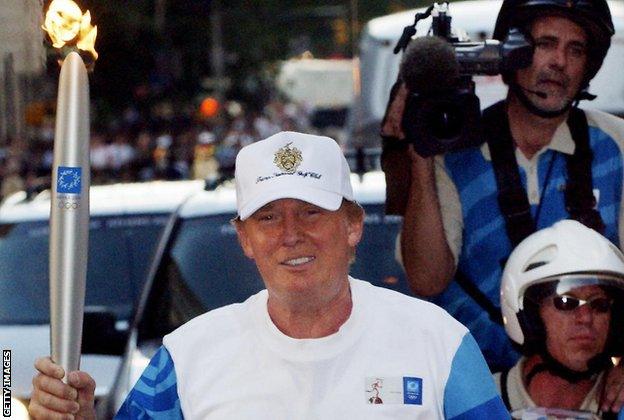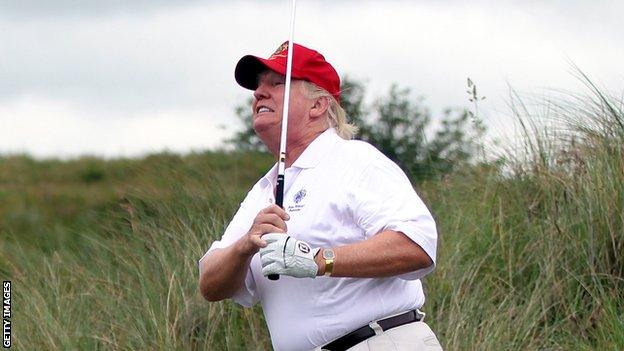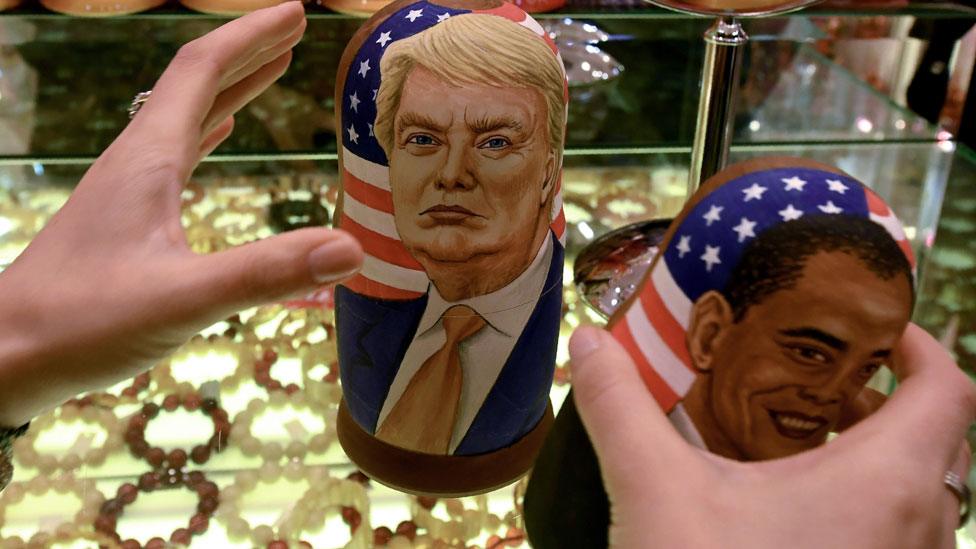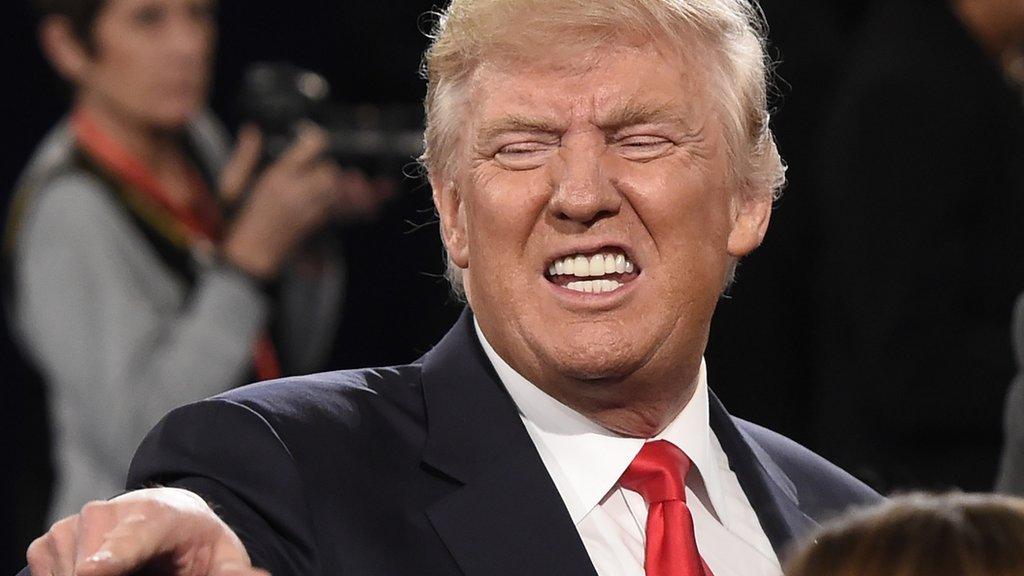Donald Trump: How will the new US president impact on sport?
- Published
'I will be president for all Americans'
Donald Trump has swept to power in the US presidential election.
There's a lot of uncertainty over his policy plans and what they'll mean for America and for the world.
His victory will also have an impact on a range of sporting issues, including the US 2024 Olympic bid, the investigation into Fifa, the 2026 World Cup and the continued global expansion of American football, baseball and basketball.
Richard Conway looks at what the future might hold with President Trump in the White House.
What impact will President Trump have on the Los Angeles bid to host the 2024 Olympics and Paralympics?
Trump's victory could be highly significant for LA's hopes and could boost its main rival, Paris.
The International Olympic Committee (IOC) is due to hold a vote to decide the host of the Games next September with Budapest the only other candidate.
Back in August, LA's mayor Eric Garcetti, a Democrat who supported Hillary Clinton, acknowledged IOC members had concerns over Trump.

Trump carried the Olympic flame in New York in the build-up to the Athens Games
"For us, I think IOC members might have said certain things," he said., external "An America that turns inward, like any country that turns inward, isn't good for world peace, isn't good for progress, isn't good for all of us."
IOC president Thomas Bach also spoke in the summer about a "world of selfishness where certain people claim to be superior to others". That was seen as a clear reference to Trump's proposed plans that include potential restrictions on Muslim immigration and the deportation of millions of illegal immigrants.
Trump's plans may not sit well with IOC voters, drawn from a range of countries and cultures.
"They wonder, 'Is America going to take this strange turn?'" added Garcetti.
USA are clear favourites for the 2026 World Cup but will a Trump administration affect how it will be staged if it wins the bid?
There's no question that the US is in pole position for football's 2026 tournament., external
Football's world governing body Fifa is deliberating over expanding the tournament to 40 or even 48 teams.
Jeremy Vine with the facts and figures
In tandem with that there's a definite shift in thinking within Fifa's leadership towards encouraging joint bids between countries.
The regional football chief, Victor Montagliani, has been careful to keep all options regarding some combination of a US/Mexico/Canada hosting arrangement on the table.
But what effect will Trump's plan to build a wall along the US border with Mexico - and to make them pay for it - have on relations between the two countries?
Trump's plan to deport illegal immigrants, his so-called "bad hombres", could also strain relations.
World Cup bids only succeed with firm government backing and solid financial guarantees. It's difficult to imagine there would be a friendly atmosphere of co-operation over a joint tournament with such big issues being argued over at senior levels within both governments.
More on Trump from BBC News:
"We will get along with all other countries, willing to get along with us," said Trump in his acceptance speech.
A USA/Canada 2026 bid may have just become a more realistic prospect.
Meanwhile, when the US play Mexico in a World Cup qualifier on Friday, it will provide an early test of whether sport can rise above politics.
Trump has threatened to end several trade deals. What impact will that have on the growth of American sport outside its borders?
Trump has a firm affinity for golf,, external owning many of the world's most prestigious courses in the US, Scotland and Dubai.
He's also tweeted sporadically about NFL and is friends with New England Patriots quarterback, Tom Brady.
And it's NFL's global ambitions - along with those of the NBA and MLB - that may be caught up under Trump's plans to impose tariffs on imported goods.

Trump's interest in golf has been well documented over many years
The leadership of America's three big sports have ambitious plans for overseas expansion. Games have been played in recent years in cities such as London, Barcelona, Rio de Janeiro, Mexico City, Shanghai and Berlin.
But economists warn that tariffs could lead to a trade war between the US and its trading partners.
Would countries such as China, facing possible tariffs of 45%, be open to hosting games for the principal benefit of US franchises and permitting beneficial tax arrangements for visiting teams and leagues?
London's mayor, Sadiq Khan, insists "London is open", external and is encouraging of American sports teams coming over to visit. That won't change - but US teams must now consider the likely impact of a radically different global economic environment.
The US Department of Justice launched criminal action in May 2015 against Fifa officials. But will President Trump and whoever he appoints as attorney general still consider it a priority?
The former New York Mayor, Rudy Giuliani, is being touted to take over from the current Attorney General, Loretta Lynch.
Giuliani made his name taking on powerful Mafia figures in New York in the 1980s. So he may relish the task of taking on the fight against corruption among football officials.
The wheels of justice will continue to turn in the US with ongoing attempts to extradite former Fifa vice president Jack Warner from Trinidad and Tobago. Another vice-president ensnared in one of the early morning raids at a Zurich hotel in June 2015, Jeffrey Webb, is awaiting sentencing by the US courts.
But will the new attorney general, whoever gets the job, continue to have the appetite to pursue the case against officials whose activities are listed in a lengthy indictment but not yet actively pursued?
America and the world awaits to see the answers.
- Attribution
- Published10 November 2016

- Published10 October 2016

- Published23 February 2016